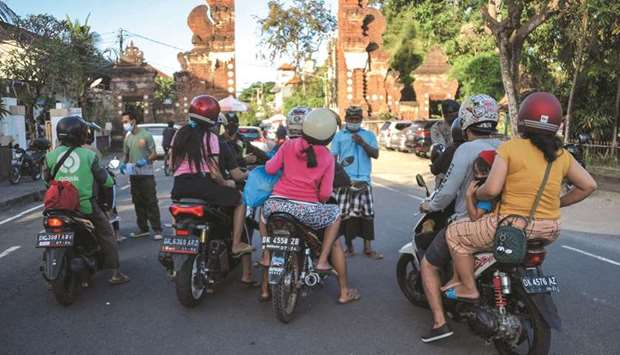China’s Foreign Minister Wang Yi urged the international community yesterday to build a “Great Wall of Immunity” to battle the coronavirus (Covid-19) pandemic.
“We should face the imminent challenges together,” Wang, who is also a member of the State Council, or cabinet, told the 9th World Peace Forum held at Tsinghua University in the capital Beijing.
“The most urgent priority is to expedite the construction of the ‘Great Wall of Immunity’ to fend off the virus, surpass political discrimination and carry out international anti-pandemic co-operation,” he said.
China, where the coronavirus first surfaced in the central city of Wuhan in late 2019, has supplied more than 480mn vaccine doses to other nations.
Wang said it would keep working to improve the accessibility and affordability of vaccines in developing countries.
As of Friday, China had administered a total of 1.28bn doses of vaccine.
Tokyo meanwhile reported 716 new Covid-19 infections yesterday, its highest in more than five weeks, as the nation considers extending pandemic restrictions in the capital just weeks before it is to host the Olympics.
Tokyo and three neighbouring prefectures are among areas under a “quasi” state of emergency set to run through July 11, but Japan may extend the measures by two weeks or more due to a recent uptick in infections.
The coronavirus surge comes as Olympic organisers struggle to decide whether to allow spectators at the Games, which start on July 23.
Having decided to ban overseas spectators, the organisers have capped the number of domestic spectators at 10,000 per venue for the Games, or 50% of capacity, despite medical experts saying no spectators would be the “least risky” option.
Yesterday’s Covid-19 number is the highest since May 26, when Tokyo had 743 new infections.
Vietnam’s health ministry reported 922 new coronavirus cases yesterday, the highest daily total since the virus was first found in the country in January last year.
Most cases were in the business hub Ho Chi Minh City, where restriction orders have been in place for the past four weeks.
Vietnam has recorded 19,043 infections overall and 84 fatalities.
Malaysia will relax coronavirus lockdowns next week in five states that have met the government’s indicators for lifting curbs, the security minister said yesterday.
The Southeast Asian country has been under a nationwide lockdown since June 1 to rein in a surge of Covid-19 infections.
Malaysian Prime Minister Muhyiddin Yassin has said that the government will gradually open up the economy and social activities in four phases, based on infection numbers, Covid-19 vaccination rates, and the capacity of the healthcare system.
Curbs are to be partially lifted in the states of Kelantan, Pahang, Perak, Perlis, and Terengganu tomorrow as they have achieved their targets for moving to the second phase of lockdown, the minister, Ismail Sabri Yaakob, told reporters.
His comments came as stricter measures took effect yesterday in the capital, Kuala Lumpur, and the neighbouring state of Selangor, which are among Malaysia’s worst-hit regions.
Yesterday’s 6,658 new cases take Malaysia’s tally of infections to 772,607, while its death toll stands at 5,327.
Indonesia imposed a partial lockdown yesterday in the capital Jakarta, across the main island of Java and on Bali as the Southeast Asian nation grappled with an unprecedented wave of coronavirus infections.
Mosques, restaurants and shopping malls were shuttered in virus hotspots around the Muslim-majority country, which recorded more than 25,000 new cases and 539 deaths on Friday, both new daily records.
Indonesia’s daily caseload has more than quadrupled in less than a month.
But the country’s official tally to date, which stands at 2.2mn cases and 59,534 deaths, is widely believed to be a severe undercount due to low testing.
“The stricter restrictions came too late,” said Jakarta resident Maya Puspita Sari. “Before, people who got Covid-19 were strangers, but now it’s also the people closest to me who are infected ... the virus is getting so much closer and it’s terrifying.”
The highly contagious Delta variant of the virus, first identified in India and now present in at least 85 countries, has been driving the recent wave, accounting for 80% of new cases in some areas, the health ministry said.
Experts previously warned that millions travelling nationwide at the end of the Muslim fasting month of Ramadan in May would trigger an explosion of cases.
The streets of Jakarta were largely deserted yesterday with shops closed as officials turned back non-essential traffic flowing in from the capital’s satellite cities – a massive urban area of some 30mn people.
The new measures announced by Indonesian President Joko Widodo this week are set to last until July 20 in hope of bringing daily infections below 10,000.
The curbs will also apply to holiday island Bali, hit by a recent jump in cases that has delayed plans to reopen to international tourists.
Yesterday, Bali police patrolled beachside eateries to enforce the lockdown.

Officers stop people on scooters heading to the beach as new measures are enforced in Sanur, on Bali island.
